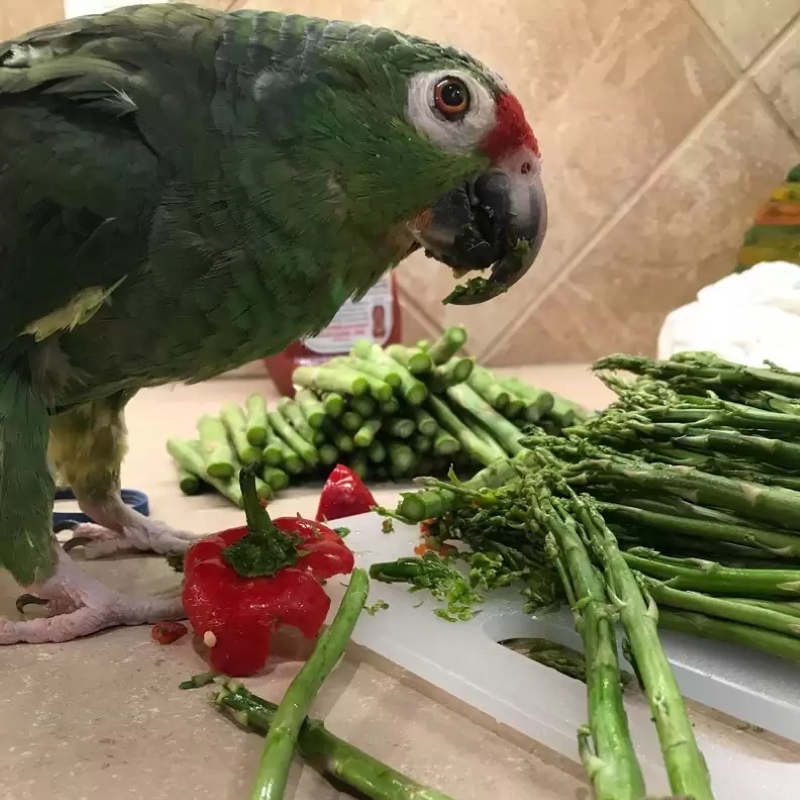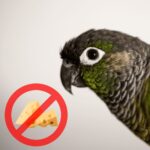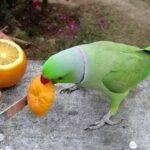Yes, parrots can eat asparagus. It is safe and nutritious for them in moderation.
Asparagus is a healthy vegetable for parrots, providing essential vitamins and minerals. It contains vitamins A, C, E, and K, as well as folate and fiber. These nutrients support a parrot’s immune system, digestion, and overall health. Introducing asparagus to your parrot’s diet can add variety and enhance their nutritional intake.
Always wash the asparagus thoroughly and cut it into small, manageable pieces to prevent choking. Offer it raw or lightly steamed without any seasoning. Monitor your parrot for any adverse reactions when introducing new foods. A balanced diet is key to a happy and healthy parrot.
Introduction To Parrots And Their Diet
Parrots are colorful and intelligent birds. They are popular pets worldwide. They need a special diet to stay healthy. Understanding their diet is crucial for their well-being.
Common Parrot Foods
Parrots eat a variety of foods. Here are some common foods:
- Fruits: Apples, bananas, and grapes
- Vegetables: Carrots, spinach, and broccoli
- Seeds: Sunflower seeds and millet
- Nuts: Almonds and walnuts
- Pellets: Special formulated bird pellets
Importance Of A Balanced Diet
A balanced diet keeps parrots healthy. It provides essential nutrients. Without it, parrots can get sick.
Here are key nutrients parrots need:
| Nutrient | Importance |
|---|---|
| Proteins | For muscle growth and repair |
| Vitamins | Boosts immune system |
| Minerals | Strengthens bones and beak |
| Fats | Provides energy |
| Fiber | Aids digestion |
Ensure your parrot gets a mix of these nutrients. Feed them a variety of foods daily.
Nutritional Value Of Asparagus
Asparagus is a healthy vegetable packed with nutrients. It offers numerous benefits for both humans and parrots. Understanding its nutritional value helps ensure a balanced diet for your feathered friend.
Vitamins And Minerals
Asparagus is rich in essential vitamins and minerals that support overall health. Here are some key nutrients found in asparagus:
| Nutrient | Amount per 100g | Benefits |
|---|---|---|
| Vitamin A | 38 µg | Supports vision and immune system |
| Vitamin C | 5.6 mg | Boosts immune function |
| Vitamin K | 41.6 µg | Assists in blood clotting |
| Folate | 52 µg | Aids in cell growth |
| Iron | 2.14 mg | Supports red blood cell production |
Health Benefits
Feeding asparagus to your parrot can provide several health benefits. Here are some important ones:
- Digestive Health: Asparagus contains fiber, aiding digestion.
- Bone Health: Vitamin K helps in maintaining strong bones.
- Immune Support: Vitamins A and C boost the immune system.
- Hydration: Asparagus has high water content, keeping your parrot hydrated.
- Antioxidants: It contains antioxidants that protect cells from damage.
Asparagus is a valuable addition to your parrot’s diet. Ensure you serve it in moderation. Always wash thoroughly before feeding.
Is Asparagus Safe For Parrots?
Parrots can safely eat asparagus in moderation. This nutritious vegetable offers vitamins and minerals beneficial for their health. Always ensure it’s fresh and pesticide-free before serving.
Asparagus is a popular vegetable among humans. But can parrots eat asparagus? This question concerns many bird owners. Let’s explore if asparagus is safe for parrots.Potential Benefits
Asparagus contains many vitamins and minerals. These nutrients can help your parrot stay healthy.- Vitamin K: Good for blood clotting.
- Vitamin C: Boosts the immune system.
- Folate: Important for cell growth.
| Nutrient | Benefit |
|---|---|
| Vitamin K | Blood clotting |
| Vitamin C | Immune support |
| Folate | Cell growth |
Possible Risks
There are some risks to consider. Not all parrots may like asparagus. Introduce it slowly to watch for any reactions. Some parrots may have an allergic reaction. Look for signs like:- Swelling
- Rashes
- Breathing problems
How To Introduce Asparagus To Your Parrot
Introducing new foods to your parrot can be exciting. Asparagus is a nutritious vegetable. It is a great addition to your parrot’s diet. Here’s how to introduce asparagus to your feathered friend.
Preparation Tips
Proper preparation is key to ensuring your parrot enjoys asparagus.
- Wash Thoroughly: Rinse asparagus under cool water to remove any pesticides.
- Cut Into Small Pieces: Slice the asparagus into small, manageable pieces.
- Steam Lightly: Lightly steam the asparagus to soften it. Avoid overcooking as it loses nutrients.
Serving Suggestions
There are several ways to serve asparagus to your parrot.
- Mix with Other Veggies: Combine asparagus with carrots or bell peppers.
- As a Treat: Offer small asparagus pieces as a special treat.
- In Foraging Toys: Hide asparagus pieces in foraging toys to stimulate your parrot.
Observing Your Parrot’s Reaction
Introducing new foods like asparagus to your parrot can be exciting. It’s important to observe how your parrot reacts to this vegetable. Careful observation ensures your parrot enjoys a safe and healthy diet.
Signs Of Acceptance
Watch how your parrot interacts with asparagus. Here are some signs that your parrot likes it:
- Eating the asparagus eagerly
- Playing with the pieces
- Making happy sounds
- Showing interest in more servings
These behaviors indicate your parrot’s acceptance. You can then include asparagus in their diet occasionally.
Possible Allergies
Some parrots might show signs of allergies. Be vigilant for these symptoms:
- Sneezing frequently
- Swelling around the eyes or beak
- Changes in droppings
- Loss of appetite
If you notice any of these signs, stop giving asparagus immediately. Consult a vet for further guidance.
It’s best to introduce asparagus gradually. Start with small amounts. This helps you monitor your parrot’s reaction effectively.

Credit: www.alamy.com
Other Safe Vegetables For Parrots
Parrots enjoy a varied diet. Including a range of safe vegetables is essential. Besides asparagus, many other vegetables can be added to their diet. These vegetables provide necessary nutrients and keep parrots healthy.
Leafy Greens
Leafy greens are excellent for parrots. They are rich in vitamins and minerals.
- Spinach – High in iron and calcium. It boosts their immune system.
- Kale – Packed with vitamins A, C, and K. It supports eye health.
- Swiss Chard – Contains magnesium and potassium. It helps with muscle function.
- Romaine Lettuce – Low in calories. It provides hydration and fiber.
Root Vegetables
Root vegetables are safe and nutritious for parrots. They provide essential nutrients.
- Carrots – Rich in beta-carotene. They promote good vision.
- Sweet Potatoes – High in vitamin A. They support the immune system.
- Beets – Contain folate and manganese. They aid in digestion and liver health.
- Turnips – Provide vitamin C and fiber. They help in boosting the immune system.
Including a variety of vegetables in a parrot’s diet is crucial. This ensures they get all the nutrients they need to thrive. Always introduce new foods gradually. Monitor for any adverse reactions. Your parrot will enjoy a healthy, balanced diet with these safe vegetables.
Creating A Varied Diet Plan
Ensuring your parrot has a varied diet is essential for its health. A diverse diet helps meet their nutritional needs and keeps them happy. Let’s explore how to create a balanced diet plan, focusing on balancing nutrients and avoiding overfeeding.
Balancing Nutrients
Parrots need a mix of vitamins, minerals, and proteins. Include fruits, vegetables, grains, and seeds in their diet. Asparagus is a healthy choice for your parrot. It provides vitamins and fiber.
Here is a simple table to help you balance their diet:
| Food Type | Examples | Frequency |
|---|---|---|
| Fruits | Apples, Bananas, Berries | 3-4 times a week |
| Vegetables | Carrots, Broccoli, Asparagus | Daily |
| Grains | Rice, Oats, Quinoa | 2-3 times a week |
| Seeds | Sunflower, Pumpkin | Daily (in moderation) |
Avoiding Overfeeding
Overfeeding can lead to obesity and health problems. Stick to the recommended portions. Avoid giving too many treats. Monitor your parrot’s weight regularly.
Here are some tips to avoid overfeeding:
- Measure food portions carefully.
- Use a feeding schedule.
- Offer fresh water daily.
- Limit high-fat seeds and nuts.
Remember, a healthy parrot is a happy parrot. Balancing nutrients and avoiding overfeeding are key steps.
Consulting With A Veterinarian
Before introducing new foods to your parrot, consulting with a veterinarian is crucial. Parrots have sensitive digestive systems. A vet can provide guidance to ensure your parrot’s diet is safe.
Professional Advice
Veterinarians offer professional advice tailored to your parrot’s specific needs. They know what foods are safe and how much to feed. This is essential for maintaining your parrot’s health.
- Vets can identify harmful foods.
- They suggest the right portion sizes.
- They help balance your parrot’s diet.
Regular Health Check-ups
Regular health check-ups ensure your parrot stays healthy. These check-ups allow vets to monitor your parrot’s overall health. Early detection of any issues is key to long-term well-being.
| Check-up Frequency | Benefits |
|---|---|
| Every 6 months | Early detection of health problems |
| Yearly | Comprehensive health assessment |
During check-ups, vets may also recommend dietary changes. This can include introducing new foods like asparagus. They will ensure the diet is nutritionally balanced.
- Schedule regular vet visits.
- Follow the vet’s dietary advice.
- Monitor your parrot’s reaction to new foods.
Consulting with a vet and regular check-ups are vital for your parrot’s health. They help in making informed dietary choices.
Conclusion And Final Thoughts
Understanding the dietary needs of your parrot is crucial. Asparagus can be a healthy addition to their diet. Let’s summarize the key points and highlight safe practices.
Summary Of Key Points
- Asparagus is safe for parrots: It is nutritious and non-toxic.
- Rich in vitamins: It provides vitamins A, C, E, and K.
- Moderation is key: Too much can cause digestive issues.
- Wash thoroughly: Remove pesticides and dirt before serving.
- Avoid seasoning: Serve it plain to avoid harmful substances.
Encouraging Safe Practices
Ensure your parrot’s safety while feeding them asparagus.
- Introduce slowly: Start with small pieces to monitor their reaction.
- Observe closely: Watch for any signs of discomfort or allergies.
- Serve fresh: Offer only fresh, uncooked asparagus.
- Balanced diet: Combine with other fruits and vegetables.
- Consult a vet: For any concerns, seek professional advice.
Feeding your parrot the right foods ensures their health and happiness. Follow these tips for a safe and nutritious diet.

Credit: blog.canvaspersonalized.com

Credit: www.youtube.com
Conclusion
Parrots can safely eat asparagus in moderation. This nutritious vegetable provides essential vitamins and fiber. Always introduce new foods gradually. Monitor your parrot for any adverse reactions. Including asparagus in your parrot’s diet can enhance their overall health. Remember to wash and chop it into small pieces for easy consumption.
Ryan Everhart is a passionate bird enthusiast and blogger, primarily writing on his website, Avian Whispers. His journey into the world of bird blogging began with a deep interest in parrots, a species that captivated his attention for their intelligence and social behavior. Over time, his content expanded to cover a broader range of bird species, offering insights into bird behavior, care, habitats, and conservation.
Ryan is dedicated to educating his audience, which includes both new bird owners and seasoned enthusiasts. His writing is filled with personal experiences, expert knowledge, and practical advice on bird care. Through Avian Whispers, he aims to foster a deeper appreciation for birds, emphasizing their role in nature and the joys of having them as pets.
Starting with articles focused on parrots, Ryan’s work now encompasses a diverse range of topics such as feeding, training, habitat enrichment, and bird health. His love for birds extends beyond parrots, diving into various avian species. His informative and heartfelt writing reflects his commitment to the well-being of birds and the desire to help others connect with these creatures.
As a growing voice in the bird blogging community, Ryan strives to provide a platform where bird lovers can learn, share experiences, and connect over a shared passion for avian life. His blogs are not only educational but also serve as a reminder of the importance of protecting and nurturing the bond between humans and birds.




